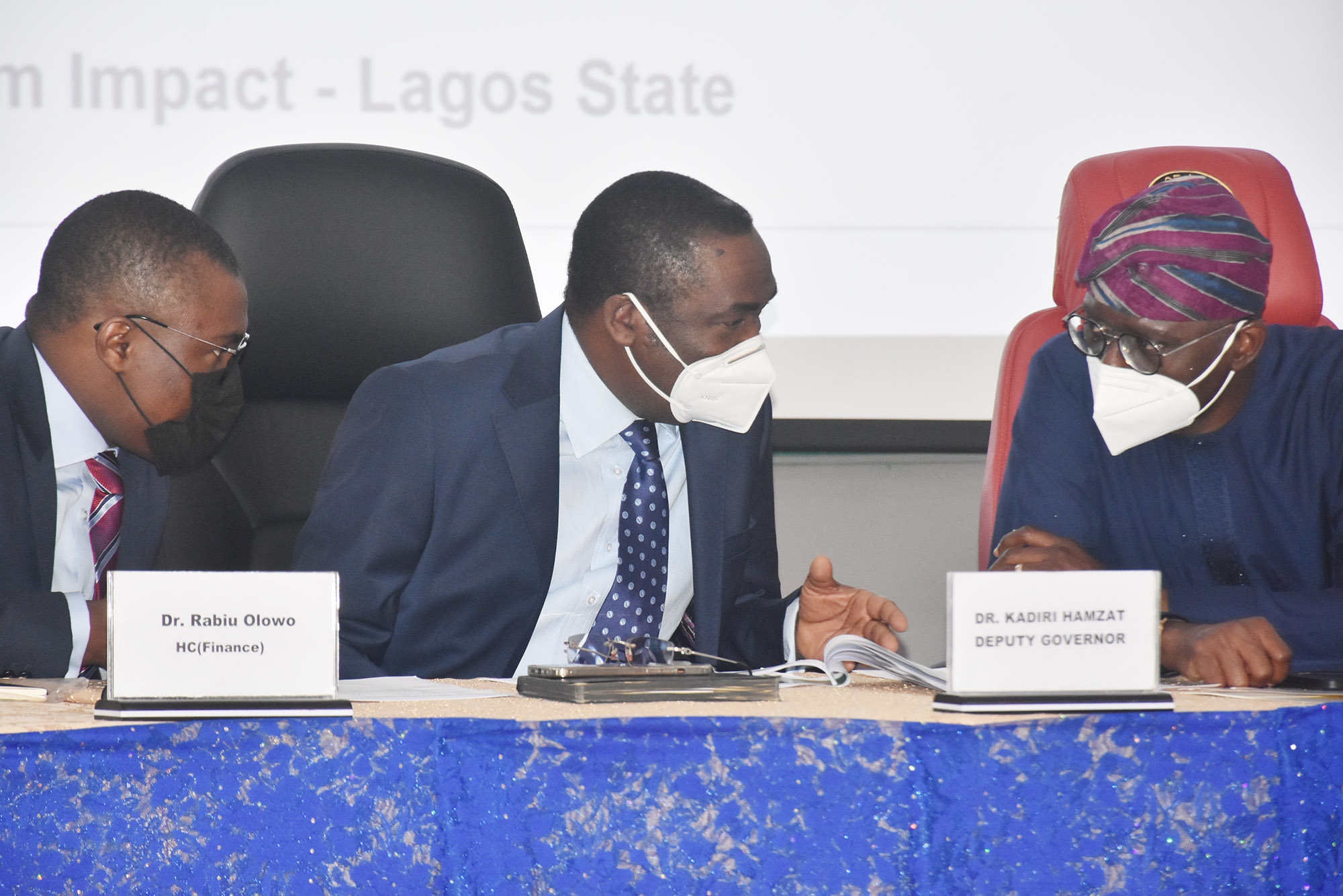Featured
Nigeria Going Through Worst Unemployment Crisis -World Bank

Nigeria is currently going through one of its worst unemployment crises in recent times, a new report by the World Bank has stated.
The multilateral institution also noted that the socio-economic challenges facing Nigerians in the last 10 years have led to an astronomical increase in the number of citizens seeking asylum and refugee status in other countries.
This is as the World Bank, in a separate report, has estimated that about 4,000 Nigerian children were made orphans by the Covid-19 pandemic between March, 2020 and July, 2021.
The report, which expressed concern about the country’s rising unemployment situation, was published by the Washington-based institution with support from the Korea World Bank Partnership Facility (KWPF) and the Rapid Social Response (RSR) trust funds.
In the report titled, ‘Of Roads Less Travelled: Assessing the Potential for Migration to Provide Overseas Jobs for Nigeria’s Youth’, the World Bank further estimated that there were 2.1million Internally Displaced Persons (IDPs) in Nigeria in 2020 alone.
World Bank, however, blamed a combination of rising unemployment, booming demographics, and unfulfilled aspirations as resulting in increasing pressure on young Nigerians to migrate in search of gainful employment overseas.
In addition, the Washington-based institution disclosed that the number of international migrants from Nigeria has increased threefold since 1990, growing from 446,806 in 1990 to 1,438,331 in 2019.
It explained that despite this trend, the share of international migrants as a proportion to Nigeria’s population has remained largely constant, increasingly slightly from 0.5 per cent in 1990 to 0.7 per cent in 2019.
According to the bank, recent rise in irregular migration notwithstanding, the share of international migrants in Nigeria’s population was much lower compared to the shares in Sub-Saharan Africa and globally.
The data showed that the number has risen by over 1,380 per cent in the years between 2010 and 2019, indicating that in comparison, the number of persons coming into Nigeria from outside has been relatively stagnant in the decade under consideration
“An important trend that is observed in the data is the rise in the number of refugees and asylum seekers from Nigeria. The share of refugees and asylum seekers from Nigeria has increased drastically in the last decade, growing from 27,557 in 2010 to 408,078 in 2019,” it stated.
It noted that although the country was reaping dividends from the success of its citizens in the Diaspora, which was put at five per cent of its Gross Domestic Product (GDP) in 2019, when it comes to the discourse on international migration, the narrative has not been palatable.
“Nigeria is facing one of the most acute jobless crises in recent times. Between 2014 and 2020, Nigeria’s working age population grew from 102million to 122million, growing at an average rate of approximately 3 per cent per year.
“Similarly, Nigeria’s active labour force population, that is, those willing and able to work among the working age population, grew from 73million in 2014 to 90million in 2018, adding 17.5million new entrants to Nigeria’s active labour force.
“Since 2018, however, the active labour force population has dramatically decreased to around 70million—lower than the level in 2014— while the number of Nigerians who are in the working-age population but not active in the labour force has increased from 29million to 52million between 2014 and 2020.
“The expanding working-age population combined with scarce domestic employment opportunities is creating high rates of unemployment, particularly for Nigeria’s youth,” the World Bank report noted.
However, between 2010 and 2020, the international financial institution estimated that the unemployment rate rose five-fold, from 6.4 per cent in 2010 to 33.3 per cent in 2020, with the rates being particularly acute since the 2015/2016 economic recession and further worsened as Covid-19 led to the worst recession in four decades in 2020.
Increasingly, it noted that educated Nigerians were struggling to find employment opportunities in the country while unemployment rates increased substantially for Nigerians across all education levels over the years, becoming progressively challenging for educated Nigerians to find employment opportunities.
“Combined with significant demographic changes and increased aspirations of the youth, Nigeria’s unemployment crisis is creating migratory pressure in the economy.
“Unemployment is considered to be a key driver of migration. Consequently, multiple surveys show that the number of Nigerians, who are looking to migrate internationally, is high and increasing,” it pointed out.
In the last few years, the bank stated that the number of persons eager to migrate has increased from 36 per cent in 2014, to 52 per cent in 2018, noting that the desire to migrate remains higher among unemployed (38 per cent), youth (39 per cent), secondary education graduates (39 per cent), urban residents (41 per cent) and post-secondary graduates (45 per cent) in Nigeria.
It maintained that since there has not been an expansion of legal migration routes for youth increasingly eager to find opportunities in the overseas labour market, young Nigerians are opting for irregular migration routes to realise their hopes for a better life.
“What is worrying, however, is the increase in the number of forced and irregular migrants from Nigeria,” it disclosed.
It stressed that to ensure mutual cooperation, the European Trust Fund for Africa (EUTF), which was established in 2015, with the aim to promote areas of mutual development interest between Europe and Africa, has since provided more than €4billion in aid to African countries to address various development-related challenges and priorities in Africa.
Since its inception, the EUTF, the bank stated, has provided more than €770million for migration-related projects in Nigeria, with most of the funds invested in border control measures, awareness campaigns to stop trafficking, and the creation of jobs domestically, including for returned Nigerian migrants.
While predicting that by 2100, Europe’s working age population between the ages of 20 and 64 would decline by 30 per cent owing to low birth-rates and increased longevity, it further projected that at same time, the working age-population in Nigeria could increase by 140 per cent.
“By expanding legal pathways for migration and implementing supporting measures to reap dividends from current migrants in the Diaspora, Nigeria can further benefit from international migration.
“Nigeria’s institutions are well-placed to promote managed migration approaches that help create opportunities for prospective Nigerian jobseekers to find employment internationally and can be supported to help design schemes that increase the returns to human capital investments for Nigerian youth,” the report concluded.
In a related development, the multilateral institution has estimated that 4,000 Nigerian children were made orphans by the Covid-19 between March, 2020 and July, 2021.
The report by the bank’s experts at the Imperial College of London, revealed that over 4,100 Nigerian children lost one or both primary caregivers within the aforementioned period, while 4,300 lost one or both primary and secondary caregivers.
The report posted on the bank’s blog was jointly authored by World Bank’s Lead Economist, Laura Rawlings and a senior technical advisor, Centre for Disease Control (CDC) Covid-19 International Task Force, Susan Hillis, and titled, “For every two Covid-19 deaths, one child loses a caregiver. We must do more to address the orphan crisis.”
The report stated: “The Covid crisis will leave many unwanted legacies. The world has been closely tracking the Covid-19 death toll, with official mortality counts now reaching over four million people, largely concentrated among adults. The children left behind have been practically invisible.
“Our estimates of the toll on children left behind, just released, are that for every two people, who die of Covid, one child is left orphaned, facing the death of a parent or grandparent caregiver, who had been living in their home.
“By the end of June 2021, because of Covid-19, our estimates show that nearly two million children under 18 years had lost a mother, father, and/or grandparent caregiver, who lived in their household.”
According to the experts, countries with primary caregiver death rates of at least one per 1,000 children include Peru (10.2 per 1,000 children), South Africa (5.1), Mexico (3.5), Brazil (2.4), Colombia (2.3), Iran (1.7), the USA (1.5), Argentina (1.1), and Russia (1.0).
They also noted that at the current rate, one child was being orphaned every 12 seconds due to a Covid-19-associated death, adding that the toll was growing.
The authors noted that the Covid-19 related deaths had a wide range of effects on the children from economic, developmental to psychological impacts, which would reverberate across generations.
According to them, children orphaned by Covid face a constellation of risks, which often arrive with rapid and broad consequences.
“The threats of poverty, malnutrition, displacement and separation from siblings or other family members, school dropout, depression, violence and child marriage can emerge suddenly from the Pandora’s box of Covid-19,” they said.
Nigeria had as of July 20, 2021, recorded about 2,128 Covid-19 deaths, suggesting that for every one death in the country, an average of two children become orphans.
Featured
Bring Your Wealth Of Experience To Governance, Ibas Tasks New SSG

The Sole Administrator of Rivers State, Vice Admiral Ibok Ete Ekwe Ibas (rtd), has charged the new Secretary to the State Government (SSG), Prof Ibibia Lucky Worika to bring his wealth of experience to bear in governance of the State.
Vice Admiral Ibas (rtd) gave the charge shortly after swearing in the new SSG at the executive chambers of Government House on Wednesday night.
The Administrator who congratulated Prof Worika on his appointment said the choice was not merely an administrative decision but a statement of intent.
Vice Admiral Ibas (rtd) explained that the new SSG has an unparallel expertise in law, policy and international governance, which align perfectly with the mission to restore law, order, integrity and public trust in Rivers State.
He said: “To our new SSG, the task ahead is onerous, but your track record leaves no doubt in our minds that you will prove your mettle. Rivers State needs your intellect, grit and unweaving dedication. Together, we will write a new chapter of progress for this great state.
“Prof Worika’s role will be critical in driving this vision, ensuring that every policy, every decision and every action is in consonance with this administration’s mandate to restore law and order, stabilize the polity and to create the necessary conditions for the restoration of democratic institutions and representations.”
Vice Admiral Ibas (rtd) pointed to his maiden address to Rivers people wherein he emphasised that his administration will be committed to delivering an effective governance that is anchored on transparency, accountability and service.
He therefore, enjoined the new SSG to brace up to the demands of his office, and offer his best service as required while also working cooperatively with civil servants.
Vice Admiral Ibas (rtd) said: “You have no time to settle down. You must roll up your sleeves and get to work with the team.
“Our civil servants with whom we will work closely to run this administration are critical stakeholders and we must work with them to ensure that the state continues to function effectively during this administration.
“To the Permanent Secretaries and civil servants as a whole, once more I will ask your kind cooperation and support as we work to achieve our objectives at this time,” he added.
Featured
I Am One Of You, Sole Administrator Tells Rivers People …Warns Against Violence, Crude Oil Sabotage

The Sole Administrator of Rivers State, Retired Vice Admiral Ibok-Ete Ibas (rtd), has assured residents that he is not in the State as a partisan actor or political competitor but as a stabilising force to restore governance and order.
In a state broadcast yesterday, Ibas, who assumed duty at Government House, Port Harcourt, emphasised his commitment to protecting civil liberties and ensuring the safety of all citizens.
However, he issued a stern warning against crude oil sabotage and violence, urging residents to resist any temptation to return to past hostilities.
“For decades, I have dedicated my life to the service of our great nation—first as the 20th indigenous Chief of Naval Staff and later as Nigeria’s High Commissioner to Ghana. I answered this call out of the need for peace in Nigeria, and most importantly, in Rivers State,” Ibas stated.
Describing the prolonged political impasse as a major setback to governance and democracy, he acknowledged the hardships faced by families and businesses due to the prevailing uncertainty.
“As a son of the Niger Delta, I am one of you. I feel the weight of this crisis on families, businesses, and the future of our people,” he said.
Ibas commended President Bola Tinubu’s decisive action in declaring a state of emergency in Rivers State, stressing that it was a necessary move to restore stability and revive economic activities.
“My mandate is clear: restore law and order, ensure stability, and create an enabling environment for economic growth. But this mission requires collective support from all stakeholders, regardless of political affiliation or ethnicity,” he stated.
He discouraged attacks on oil infrastructure, reminding residents of the devastating environmental and economic consequences of such actions.
“The Niger Delta has moved beyond the destruction of oil facilities. We must resist the temptation to return to those ugly days,” he cautioned.
While pledging to uphold civil liberties and the rule of law, the Sole Administrator warned that lawlessness and violence would not be tolerated.
“We will not act arbitrarily, but we will not hesitate to deal decisively with anyone who threatens the peace and stability of Rivers State,” he declared.
Ibas revealed that he had concluded a State Security Council meeting where strategic measures were outlined to de-escalate tensions and prevent further conflict.
Expressing gratitude to President Tinubu for entrusting him with the responsibility, he also acknowledged the National Assembly for approving the emergency declaration.
“I will work closely with the national leadership under the guidance of the President. I am optimistic that Rivers State will emerge stronger and greater,” he concluded.
Featured
Abuja Truck Explosion Death Toll Rises To 10 …As Another Truck Crashes On Same Spot

The Federal Capital Territory Emergency Management Department has confirmed that 10 persons have died in the truck explosion that occurred near Karu bridge, along the Abuja-Keffi Expressway, on Wednesday.
The FEMD’s Head of Public Affairs, Nkechi Isa, confirmed the numbers in a statement, yesterday.
The Acting Director General of the Emergency Department, Abdulrahman Mohammed, had earlier confirmed that eight persons had died as of yesterday morning, with five confirmed dead on the scene, and four others burnt beyond recognition.
““Five people were taken dead from the scene yesterday (Wednesday). Out of the people that were injured, one died, making six. Then this morning (yesterday), when I asked my people to go round, they discovered that two had already died again, making eight. Four of them from yesterday were burnt beyond recognition.”, he explained.
However, in her statement, Isa said the Head, Forecasting Response and Mitigation of FEMD, Mr Mark Nyam, said eight bodies were deposited at the Karu Hospital Morgue, one body at the Asokoro Distinct Hospital Morgue while another body was deposited at the National Hospital.
He added that some victims had been referred to the Gwagwalada Teaching Hospital, Federal Medical Centre, Keffi, and Cedercrest Hospital Abuja for proper care.
Part of the statement reads, “The FCT Emergency Management Department FEMD can confirm that 10 persons lost their lives to the truck explosion that occurred at Karu bridge along Abuja / Keffi expressway.
“The Head Forecasting Response and Mitigation of FEMD, Mr Mark Nyam said eight bodies were deposited at the Karu Hospital Morgue, one body at the Asokoro Distinct Hospital Morgue while another body was deposited at the National Hospital.”
He informed that over 30 persons suffered various degrees of burns.
“Some of the victims have been referred to Gwagwalada Teaching Hospital, Federal Medical Centre,Keffi and Cedercrest Hospital Abuja for proper care,” he said.
Isa also stated that no fewer than 10 vehicles were burnt during the incident, adding that the FEMD boss after a visit to the incident scene, appealed to motorists to observe traffic rules and regulations.
He also cautioned against reckless driving, dangerous overtaking and poor maintenance of vehicles, while urging FCT residents to always use the 112 emergency toll free number in the event of an emergency.
Meanwhile, barely 24 hours after the incident, another fertiliser-laden truck has collapsed on the same spot.
The Tide learnt that the incidence occurred at about 3:54pm yesterday.
The Head of Public Affairs of the FCT Emergency Management Department, Nkechi Isa, confirmed the accident in a statement, stating that the truck collided with a Hijet and a dump truck, adding that no life was lost.
She cautioned road users to drive with caution as the Federal Road Safety Corps was making efforts to tow away the affected vehicles, to avoid traffic built up.
“Another accident has occurred under Karu bridge along the Abuja-Keffi Expressway. Thankfully, no life was lost to the incident. Our Search and Rescue say the accident occurred when a truck laden with fertilizer ran into a Hijet and a dump truck also known as tipper.
“Motorists are advised to drive with caution as the Federal Road Safety Corps is taking steps to tow away the affected vehicles in order to avoid traffic built up,” the statement read.
Meanwhile, several videos showed some persons trying to clear the fertiliser bags from the fallen truck to ease traffic.
-

 News1 day ago
News1 day agoUS Supreme Court stops Trump from deporting migrants
-

 Maritime17 hours ago
Maritime17 hours agoEnugu Plans Intra Rail System To Boost Trade
-

 Rivers1 day ago
Rivers1 day agoBSN Advises Churches In Bille To Unite For Revival
-

 Sports1 day ago
Sports1 day agoNSC, NCS Approve Fixed Calendar For Sports Festival
-

 News1 day ago
News1 day agoEaster: Fubara Urges Support For Tinubu
-

 Politics1 day ago
Politics1 day agoObi Urges Prayers For ‘Tender-Hearted, Caring’ Leaders
-

 News1 day ago
News1 day agoEx-SGF Tasks Leaders On Patriotism, Integrity
-

 Maritime17 hours ago
Maritime17 hours agoCustoms PTML Command Rakes In N90.2bn In Q1 2025











